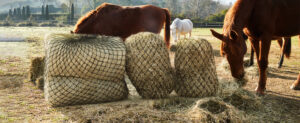Contact Us: [email protected] WhatsApp: +86-1365-3417-367
Introduction
Gastric ulcers in horses are a significant health challenge, affecting up to 90% of performance horses and a high proportion of leisure horses.
This condition not only impacts their health but also their ability to perform and their overall quality of life.
This comprehensive guide aims to offer a thorough understanding of gastric ulcers in horses and effective strategies for prevention.
Understanding Equine Gastric Ulcers
Equine Gastric Ulcer Syndrome (EGUS) presents a complex health issue, characterized by lesions in the stomach lining.
This condition can manifest in various forms, from mild discomfort to severe complications affecting the horse’s overall health and performance.
Symptoms can be subtle, often leading to underdiagnosis.
Therefore, it’s crucial for horse owners and caretakers to understand the nature of these ulcers, their impact, and the factors contributing to their development.
Causes and Risk Factors
Gastric ulcers result from a combination of factors, including dietary habits, stress, and lifestyle.
Horses with limited forage intake, high-concentrate diets, and those undergoing strenuous training are at a higher risk.
Management practices like prolonged confinement, irregular feeding schedules, and certain medications (particularly NSAIDs) also contribute to ulcer development.
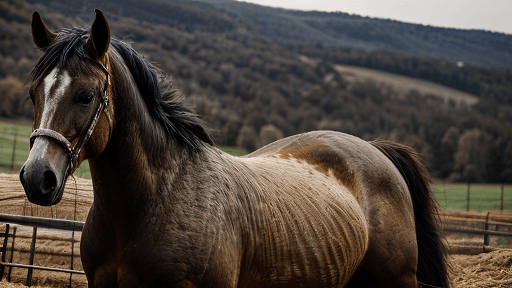
Dietary Adjustments
The diet plays a crucial role in either exacerbating or alleviating the risk of gastric ulcers in horses.
An understanding of the equine digestive system is critical for effective dietary management.
- Forage-Based Diet
A forage-first approach is highly recommended. Horses are natural grazers, and their digestive systems are designed to process forage continuously.
This type of diet ensures consistent saliva production, which is crucial as saliva contains bicarbonate that acts as a natural buffer against stomach acid.
The “Ultimate Guide to Horse Feed, Supplements, and Nutrition” underscores the importance of free-choice forage to prevent acid buildup in the stomach, which is a primary cause of ulcers.
- Slow Feed Systems
Implementing a ‘slow feed’ system, like specialized hay nets, can significantly benefit this approach.
These systems encourage horses to eat slowly and continuously, mimicking natural grazing patterns.
This not only maintains consistent saliva flow but also prevents extended periods of an empty stomach, thereby reducing the risk of acid buildup and ulceration. Introducing such methods, including products like durable slow feed hay nets, provides horses with a healthier eating pace, closer to their natural grazing habits.
- Reducing Concentrates
While concentrates are a common part of many horse diets, especially for high-performance animals, they should be administered cautiously.
Concentrates, particularly those high in starch and sugar, can increase gastric acidity, thereby heightening the risk of ulceration.
These feeds require less chewing, resulting in less saliva production, and are digested more rapidly, leaving the stomach empty for longer periods – a scenario that contributes to acid-related damage to the stomach lining.
- Consistent Water Access
Dehydration can contribute to the development of ulcers.
Constant access to fresh, clean water helps not only in hydration but also in maintaining regular digestive function, thereby reducing the risk of gastric ulcers.
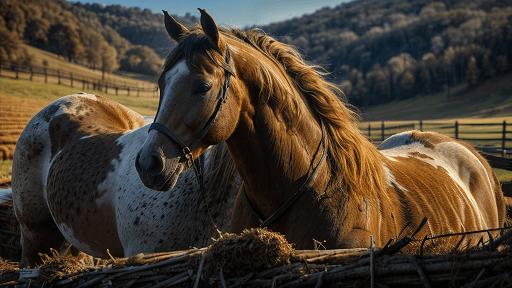
Stress Management
Stress is a significant factor in the development of gastric ulcers.
Managing stress in horses is a multifaceted approach, involving both physical and psychological aspects.
- Creating a Comfortable Environment
The living conditions of a horse greatly influence their stress levels.
Stables should be comfortable, well-ventilated, and as natural as possible.
Social interaction with other horses can also play a positive role in reducing stress.
- Routine and Familiarity
Horses thrive on routine. Regular feeding times, consistent exercise schedules, and familiar handlers can significantly reduce stress.
Unpredictable changes in their environment or routine can be a source of anxiety, which can trigger the development of gastric ulcers.
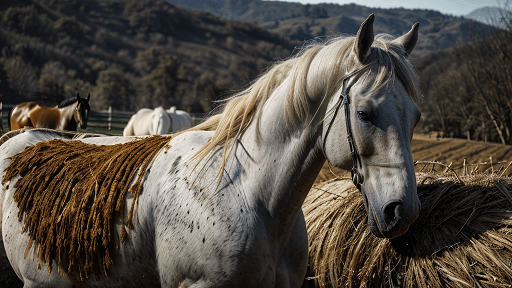
Exercise and Activity Management
Balanced physical activity is essential for a horse’s overall well-being and plays a significant role in preventing gastric ulcers.
- Balanced Exercise Regimes
Exercise is crucial for maintaining a horse’s health, but it needs to be balanced.
Excessive or overly strenuous exercise can increase the risk of ulcers by increasing stomach acid production and reducing blood flow to the stomach lining.
It’s vital to develop an exercise routine that matches the horse’s fitness level and gradually increases in intensity.
- Post-Exercise Care
After exercise, a horse’s digestive system needs time to return to its normal state.
Feeding concentrates immediately post-exercise can exacerbate the risk of ulceration.
It is advisable to allow a cooldown period and offer a small, easily digestible meal or forage to support the recovery process.
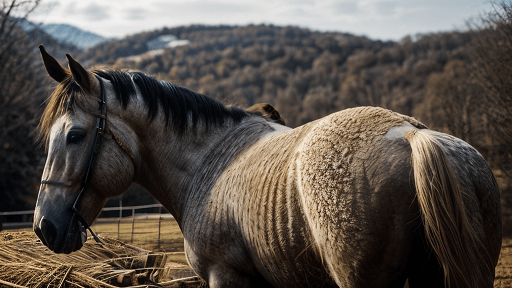
Recognizing Early Symptoms
Early detection and treatment of gastric ulcers can prevent more severe health issues.
- Symptom Awareness
The early signs of gastric ulcers can be subtle and easily overlooked.
Indications include changes in appetite, weight loss, a dull coat, behavioral changes like irritability or lethargy, and a decrease in performance.
Monitoring these signs is crucial for early intervention.
- Veterinary Diagnosis
Regular veterinary check-ups are vital for early detection of ulcers.
An endoscopic examination is the definitive method for diagnosing gastric ulcers.
It involves inserting a camera through the esophagus into the stomach to visually inspect the lining for ulcers.
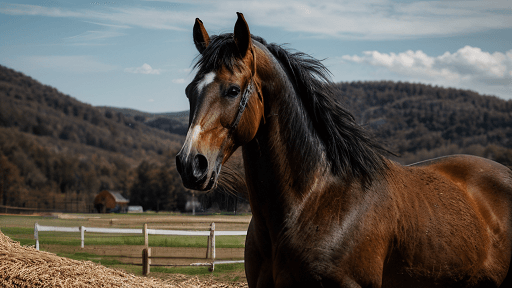
Supplemental Nutrition
Supplements can play a role in preventing and managing gastric ulcers.
- Beneficial Supplements
Supplements like omega-3 fatty acids can be beneficial for horses prone to gastric ulcers.
These supplements can help reduce inflammation in the digestive tract and support overall gut health.
Additionally, specific supplements designed for gastric health can provide added protection against ulcers.
- Choosing the Right Hay
The type of hay fed to horses can also impact their risk of developing ulcers.
Alfalfa hay, for example, is high in calcium and protein, which can help buffer stomach acid and reduce ulcer risk.
It’s important to choose high-quality hay and incorporate it as a significant portion of the horse’s diet.
Medication and Treatment
Medications, particularly non-steroidal anti-inflammatory drugs (NSAIDs), can increase the risk of gastric ulcers in horses.
Therefore, their use should be carefully managed.
- NSAIDs and Ulcers
NSAIDs, while effective for pain management, can impair the stomach lining’s ability to protect itself from acid.
When necessary, these medications should be used at the lowest effective dose for the shortest possible duration.
Always consult with a veterinarian before administering any medication.
- Ulcer Medications
For horses diagnosed with ulcers, specific medications can be prescribed to reduce stomach acid production and protect the stomach lining.
These treatments are typically effective but require adherence to dosing schedules and duration as recommended by a veterinarian.
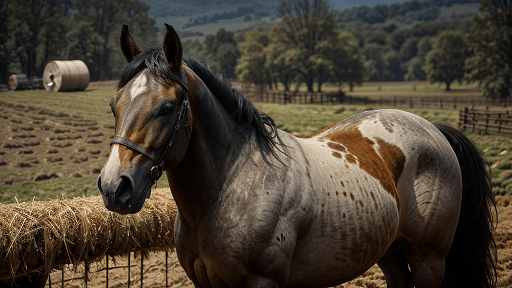
Long-Term Health Management
Preventive care is an ongoing process that involves regular health assessments and adaptations to management practices based on the horse’s needs.
- Regular Veterinary Check-ups
Consistent veterinary visits are essential for monitoring the horse’s overall health and adjusting ulcer prevention strategies as needed.
These check-ups can identify potential issues before they become serious problems.
- Lifestyle Adjustments
Lifestyle changes, such as increasing turnout time, ensuring social interaction with other horses, and adjusting exercise routines, can significantly impact the horse’s risk of developing gastric ulcers.
These adjustments should aim to mimic natural equine behaviors and reduce stress.
Conclusion
Preventing gastric ulcers in horses requires a comprehensive approach that encompasses diet, stress management, exercise, medication use, and overall lifestyle.
By adhering to these guidelines, horse owners can play a crucial role in enhancing their horses’ health, well-being, and quality of life.

